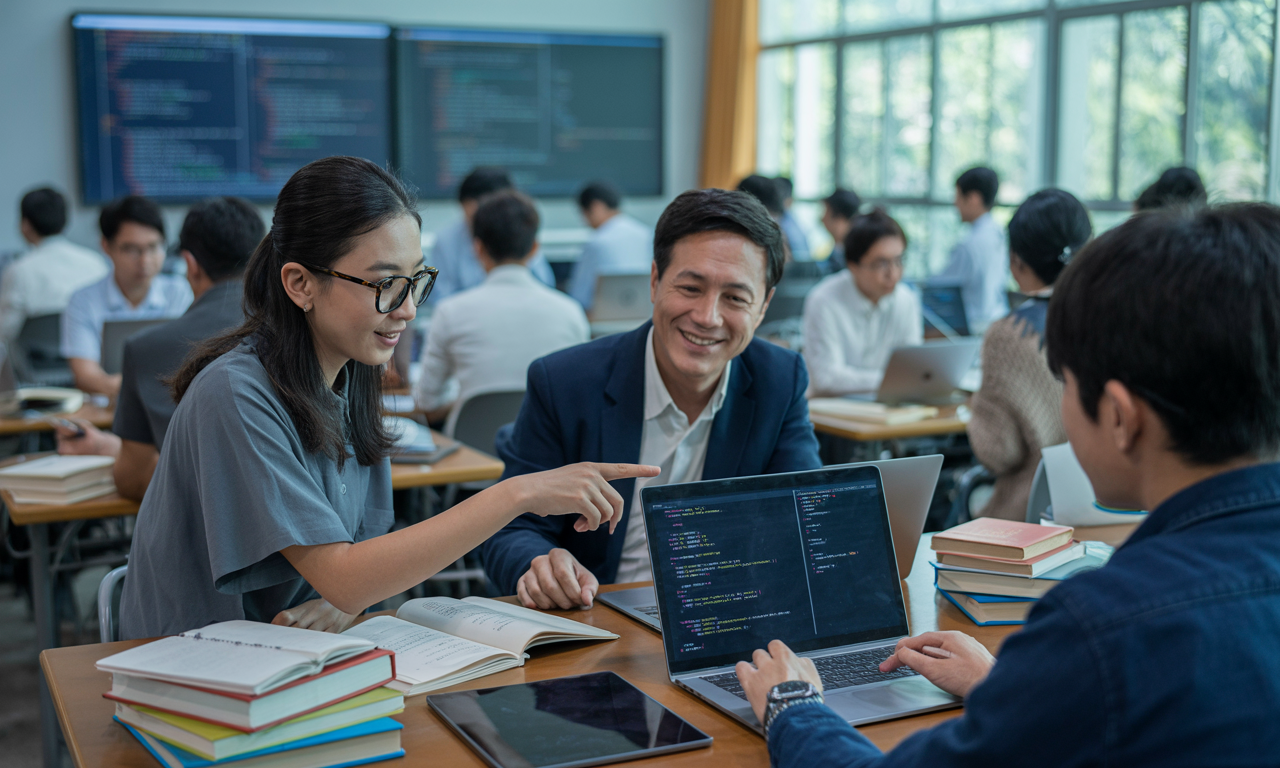
Fostering Digital Skills and Adaptability
Equipping KKU Graduates for a Dynamic World
In pursuit of its Education Transformation, Khon Kaen University aims to prepare students not just with domain expertise but also with robust digital competencies and an adaptable mindset. As global workplaces evolve under Industry 4.0, the interplay of digital, physical, and biological systems demands graduates who can navigate complex tools, collaborative platforms, and continuous change.
This initiative focuses on developing foundational digital literacy, advanced technological fluency, and lifelong learning habits to ensure our graduates thrive in rapidly shifting environments.
The Imperative: Why Digital Skills & Adaptability Matter
The Fourth Industrial Revolution reshapes industries by merging emerging technologies—AI, IoT, big data, and biotechnology. In this context:
- Foundational Digital Literacy: Skills such as advanced information seeking, digital communication etiquette, and data privacy awareness form the baseline for professional competence.
- Specialized Technical Proficiency: Abilities like programming fundamentals, data visualization, simulation modeling, and AI tool usage unlock new problem-solving avenues in every discipline.
- Collaborative Digital Toolkit: Proficiency with cloud-based collaboration suites, virtual meeting platforms, and project management software fosters teamwork across distances.
- Adaptability & Metacognition: The capacity to learn, unlearn, and relearn—supported by reflective practices and self-assessment—ensures relevance amid evolving job requirements.
KKU’s strategy aligns with global frameworks such as Education 4.0 and the OECD Future of Education and Skills 2030, emphasizing critical thinking, creativity, and collaborative problem-solving alongside technical skills. Our curriculum embeds adaptability through iterative learning experiences and exposure to emerging technologies.
Practical Strategies to Integrate Skills & Adaptability
1. Embed Discipline-Specific Tools
- Industry Software Integration: Incorporate CAD, SPSS, GIS, or domain-specific simulation platforms into coursework and labs.
- Virtual and Augmented Reality: Use VR/AR for immersive training scenarios in engineering, healthcare, and architecture.
- AI and Automation Modules: Introduce low-code AI tools and RPA demos to showcase automation potentials.
2. Cultivate Advanced Information Literacy
- Critical Source Analysis: Teach frameworks for evaluating digital content credibility, bias, and authorship.
- Ethical Use & Citation: Reinforce copyright, open licensing, and proper digital attribution practices.
- Data Ethics Discussions: Facilitate debates on data privacy, algorithmic bias, and responsible AI.
3. Encourage Digital Creativity & Innovation
- Multimedia Showcases: Assign projects using podcast production, video editing suites, or interactive e-portfolios.
- Hackathons & Innovation Challenges: Organize cross-disciplinary hackathons focusing on real-world issues.
- Maker Spaces & IoT Labs: Provide access to 3D printers, microcontrollers, and sensor kits for hands-on prototyping.
4. Design Adaptive, Self-Directed Pathways
- Personal Learning Dashboards: Offer LMS dashboards that track skill badges, recommend resources, and display progress metrics.
- Adaptive Learning Modules: Employ AI-driven quizzes that adjust difficulty based on performance.
- Reflective Practices: Build in regular self-assessment journals and peer reflections to foster metacognition.
5. Foster Interdisciplinary Collaboration
- Team Projects: Create assignments pairing students from different faculties to solve complex, real-world challenges.
- Peer Mentorship: Establish cross-year mentoring programs where advanced students guide newcomers in tech skills.
- Industry Partnerships: Collaborate with businesses to co-design modules and provide real-data case studies.
By systematically embedding digital tools, critical literacies, creative innovation, and adaptive learning pathways into the curriculum, KKU empowers graduates to become agile, digitally fluent leaders. This comprehensive approach to Technology-Enhanced Learning and adaptability positions our alumni at the forefront of a dynamic global landscape, equipped with the wisdom and skills to drive positive change.
